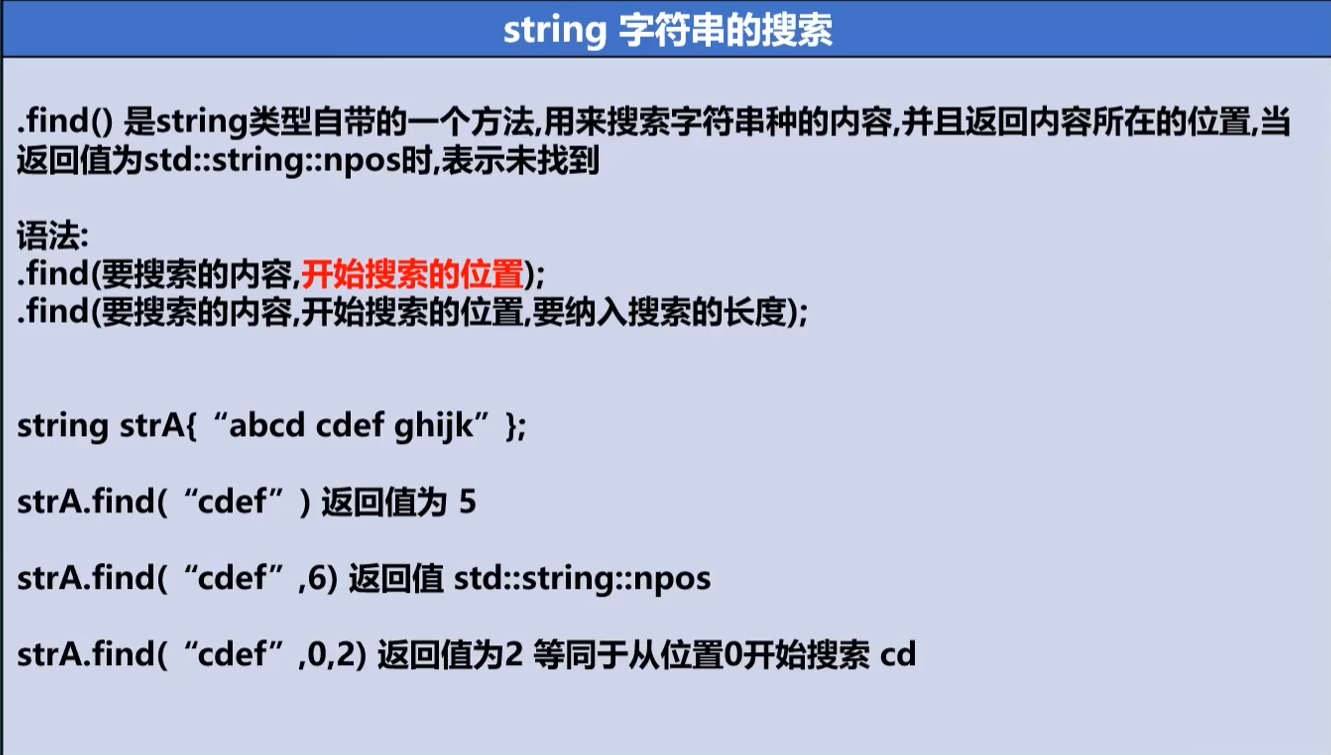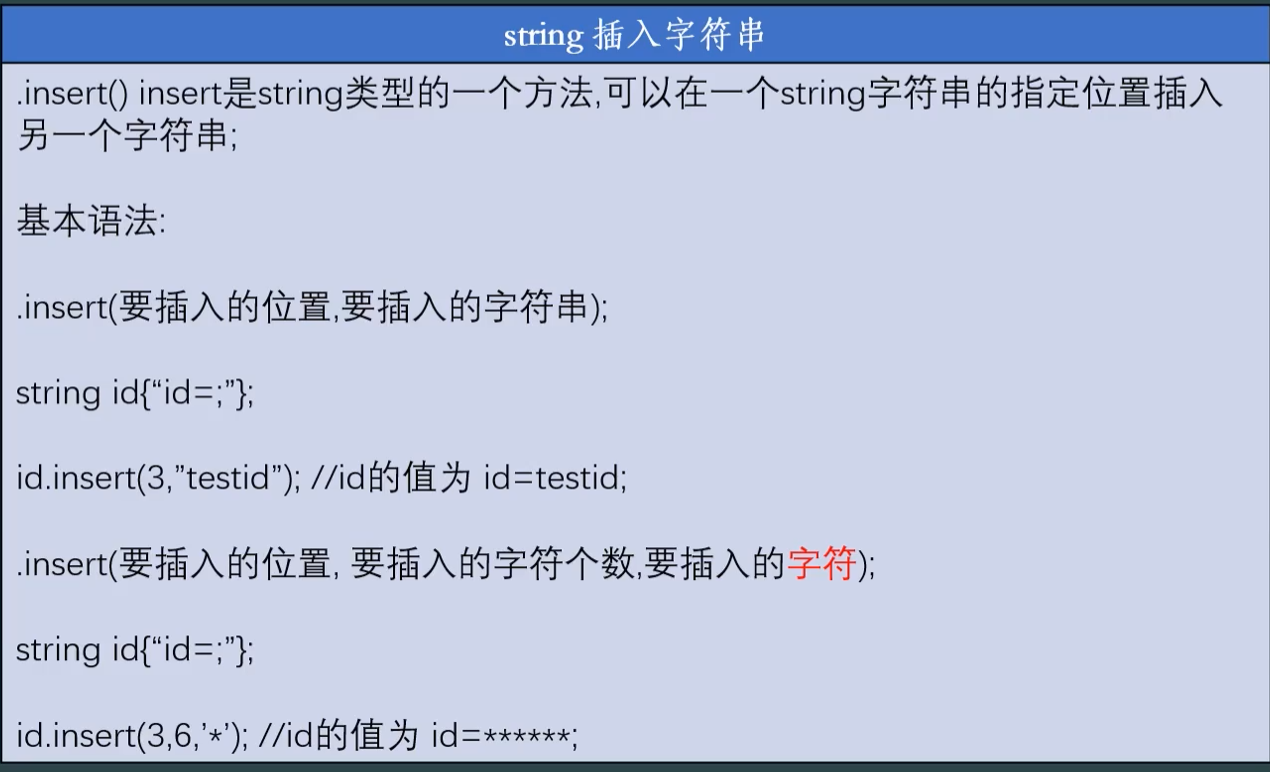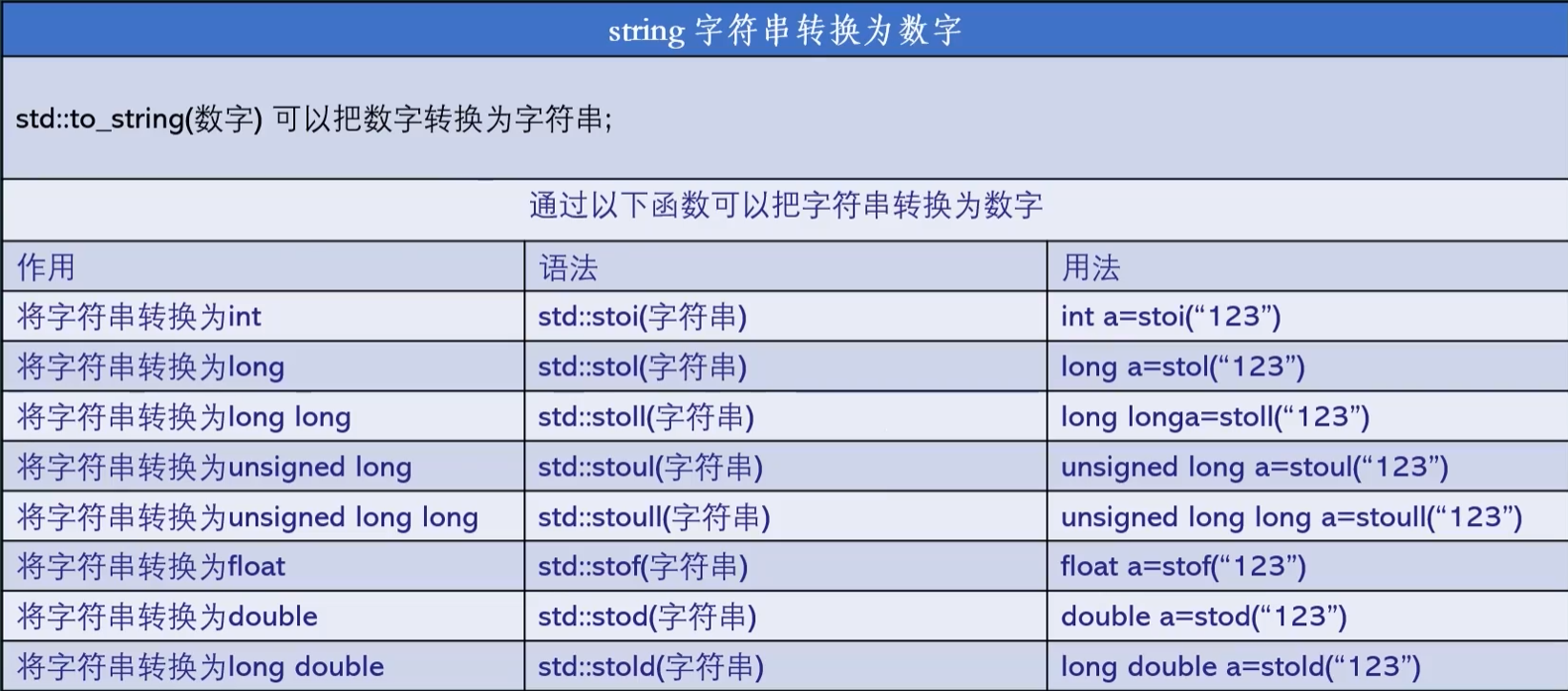联合体语法
1
2
3
4
5
6
7
|
union USER
{
short sHP;
int nHP;
};
|
实践一下
1
2
3
4
5
6
7
8
9
10
11
12
13
14
15
16
17
18
19
20
21
22
23
24
25
26
27
28
29
30
31
32
33
34
35
36
37
38
39
40
41
42
|
#include <iostream>
union USER
{
short sHP;
int nHP;
double fHP;
};
union {
short sHP;
int nHP;
double fHP;
} ls;
typedef struct Test {
short sHP;
int nHP;
double fHP;
};
int main()
{
USER user;
Test t;
std::cout << sizeof(user) << std::endl;
std::cout << sizeof(t) << std::endl;
user.sHP = 100;
std::cout << user.sHP << std::endl;
std::cout << user.nHP << std::endl;
user.nHP = 0;
std::cout << user.nHP << std::endl;
}
|
未命名的联合体是供临时使用的!
C 语言中 字符串的拼接
1
2
3
4
5
6
7
8
| char str[0x10] = "123";
char strB[0x10] = "456";
char strC[0x20];
memcpy(strC, str, strlen(str));
memcpy(strC + strlen(str), strB, strlen(strB) + 1);
std::cout << strC;
|
C++ 中 字符串拼接
1
2
3
4
5
6
7
8
9
10
11
12
13
14
15
16
17
18
19
20
21
22
23
24
25
26
27
28
29
30
31
32
33
34
35
36
| string str{"12345"};
std::cout << str << std::endl;
string str1{ "123455", 3 };
std::cout << str1 << std::endl;
string str2{ "0123456",2,3 };
std::cout << str2 << std::endl;
string str3{ "你好啊啊啊", 3 };
std::cout << str3 << std::endl;
string str4(6, 'a');
string str5(6, 65);
std::cout << str4 << std::endl;
std::cout << str5 << std::endl;
string str6, str7;
str6 = "123";
str7 = "456";
str6 = str7 + " " + "123";
std::cout << str6 << std::endl;
int age;
std::cin >> age;
string st;
st = " 用户的年龄是:";
str7 = st + std::to_string(age);
std::cout << str7;
|
C++ 中字符串拼接(进阶)
1
2
3
4
5
6
7
8
9
10
11
12
13
14
15
16
17
18
19
20
21
22
23
24
25
26
27
28
29
30
31
32
33
34
35
36
37
38
39
40
41
42
43
44
45
46
47
48
49
50
| #include <iostream>
using std::string;
#define SoftName "EDY"
#define SoftVersion "2.0"
int main()
{
string str;
str = string{ "!22" } + "1233";
str = "abc" + ("bcd" + string{ "123" });
str += "aka";
str += "aka" + string{ "bka" };
string strB;
strB = "!23""233";
strB = SoftName SoftVersion;
string strC{"123"};
char a;
std::cin >> a;
str += a;
str += a + 'o';
str += char(a + 'o');
string strD{"123"};
strD.append("456");
strD.append("222").append("dfddd");
strD.append("123455", 2);
}
|
截取字符串
1
2
3
4
5
6
7
8
9
10
11
| .substr(起始位置,要截取的长度);
std::string str{"123456"};
std::string strsub{str.substr(1)};
std::string strsubA{str.substr(1, 3)};
string strB;
strB = str.substr(7).substr(3);
|
计算字符串长度
1
2
3
| string str{"222222"};
std::cout << str.length();
|
下面是一个正常计算字符串的方法
1
2
3
4
5
6
7
8
9
10
11
12
13
14
15
16
17
18
| #include <iostream>
#include <locale>
int main() {
setlocale(LC_ALL, "chs");
wchar_t wstr[255];
std::wcout << L"请输入一个字符串: ";
std::wcin.getline(wstr, 255);
int length = 0;
for (int i = 0; wstr[i] != L'\0'; ++i) {
++length;
}
std::wcout << L"字符串的长度是: " << length << std::endl;
return 0;
}
|
字符串比较
1️⃣ 比较相同的内容
1
2
3
4
| char* str_1{(char*)"123456"};
char* str_2{(char*)"123456"};
std::cout << (str1 == str2) << std::endl;
|
1
2
3
4
5
| char* str_1{(char*)"123456"};
char* str_2 = new char[7];
std::cin >> str_2;
std::cout << (str1 == str2) << std::endl;
|
1
2
3
4
5
| string str_1{"123456"};
string str_2;
std::cin >> str_2;
std::cout << (str1 == str2) << std::endl;
|
2️⃣ 比较不同的内容
1
2
3
4
5
6
7
8
9
| string str_1{"abcdef"};
string str_2{"bcdefg"};
if(str_1 > str_2)
{
std::cout << "大于";
}
else std::cout << "小于等于";
|
1
2
3
| string str_1{"abcdef"};
str1.compare("bcdefg");
|
3️⃣ 截取一段之后进行比较
1
2
| string strA{"abc cdef"};
strA.compare(5,4,"cdef");
|
1
2
| string strA{"abc cdef"};
strA.compare(5,4,"cdef ghijklm", 0, 4);
|
1
2
3
4
5
| string strA{"username:5620;studentId:655555"};
std::cout << strA.find("studentId:");
std::cout << strA.substr(strA.find("studentId:"));
std::cout << strA.substr(strA.find("studentId:") + 10);
|
补充 find() 方法 的用法

1
| str.find("sdajklfdkasjlkfjlas", 0, 10);
|
倒着搜索
1
2
|
str.rfind("sdajklfdkasjlkfjlas", 0);
|
字符串的应用–小项目

1
2
3
4
5
6
7
8
9
10
11
12
13
14
15
16
17
18
19
20
21
22
23
| #include <iostream>
#include <string>
using std::string;
int main()
{
string str{ "id=user;pas=632105;role=阿森;" };
string strIn;
string strOut;
while (true)
{
std::cout << "请输入您要查阅的属性:\n";
std::cin >> strIn;
int lfind = str.find(strIn + "=");
if (lfind == std::string::npos)
std::cout << "查找的属性不存在";
else
{
int lend = str.find(";", lfind);
strOut = str.substr(lfind + strIn.length() + 1, lend - lfind - strIn.length() - 1);
std::cout << strOut << std::endl;
}
}
}
|
插入字符串
1
2
3
4
5
|
.insert();
string id{"id=;"};
id.insert(3,"testId");
std::cout << id;
|

1
2
3
4
5
6
7
8
|
string id{"id="};
id.insert(3,6,'*');
std::cout << id << std::endl;
id.insert(3, "testid");
std::cout << id;
|
1
2
3
4
| string id{"id="};
id.insert(3,"killertestid", 6, 6);
std::cout << id << std::endl;
|
1
2
3
| string id{"id="};
id.insert(3,"killertestid123456",6);
|
指针数组字符串
str和 str[0] 不是一个位置,具体跟数组有区别,涉及到运算符重载
str的地址和str[0]的地址差4
1
2
3
| string str{"12344"};
std::cout << (int)&str << " " << (int)&str[0] << " " << (int)&str[1];
|
1
2
3
4
5
6
7
8
9
10
11
12
13
14
15
16
17
18
19
| string str{"12345"};
std::cout << str[0] << std::endl;
std::cout << (int)&str << " " << (int)&str[0] << " " << (int)&str[1] << std::endl;
str = str + "534894539823478923";
std::cout << (int)&str << " " << (int)&str[0] << " " << (int)&str[1] << std::endl;
const char* baseStr = str.c_str();
std::cout << (int)&str << " " << (int)&str[0] << " " << (int)&str[1] << " " << (int)baseStr << std::endl;
const char* dataStr = str.data();
std::cout << (int)&str << " " << (int)&str[0] << " " << (int)&str[1] << " " << (int)baseStr << std::endl;
|
- 返回一个
const char* 指针,指向以空字符 \0 结尾的 C 风格字符串。
- 返回的字符串数据与
std::string 对象内部保持一致,但不能修改返回值(它是 const 的)。
字符串替换
1
2
3
4
5
6
7
8
9
10
11
12
13
14
15
16
17
18
19
20
21
22
23
24
|
.replace(要替换的内容的起始位置,要替换的长度,“替换后的内容”);
string strId{"id=user;"};
strId.replace{3,4,"zhangsan"};
std::cout << strId;
.replace(要替换的内容的起始位置,要替换的长度,替换后的字符长度,‘字符’);
str.replace(3,4,6,'*');
.replace(要替换的内容的起始位置,要替换的长度,"替换后的内容",替换后内容的长度节选);
str.replace(3,4,"zhangsan!pkaq",8);
.replace(要替换的内容的起始位置,要替换的长度,"替换后的内容",替换后的内容的起始位置,替换后内容的长度节选);
str.replace(3,4,"zhangsan!pkaq",9,,4);
|
删除字符串内容
1
2
3
4
5
6
7
8
9
10
11
12
13
14
15
|
.erase(要删除的起始位置,要删除的起始长度);
string str{"id=user;"};
str.erase(3,4);
.erase(要删除的起始位置);
string str{"id=user;"};
str.erase(3);
.erase();
.clear();
|
字符串(补充)
计算字符串长度
1
2
3
4
5
6
7
8
9
10
11
12
| string strIn;
std::cin >> strIn;
int length{0};
for (int i = 0; strIn[i]; i ++ )
{
if (strIn[i] < 0) i ++ ;
length ++ ;
}
std::cout << length;
|
字符串转换
1
2
| string cIn = "123";
int x = std::stoi(cIn);
|

字符串流
1
2
3
4
5
6
7
8
9
10
11
12
13
14
| #include <iostream>
#include <string>
#include <sstream>
using std::string;
using std::stringstream;
int main()
{
stringstream strS;
strS << "你好" << "123 [" << std::hex << 12530 << "]";
string strX = strS.str();
std::cout << strX;
}
|
字符串项目
1
2
3
4
5
6
7
8
9
10
11
12
13
14
15
16
17
18
19
20
21
22
23
24
25
26
27
28
29
30
31
32
33
34
35
36
37
38
39
40
41
42
43
44
45
46
47
48
49
50
51
52
53
54
55
56
57
58
59
| #include <iostream>
#include <string>
using std::string;
typedef struct Role
{
string Id;
int Exp;
}*PROLE;
int main()
{
string strData = "id=Tomy Clare;exp=9523;id=Sunny;exp=9523;id=DyBaby;exp=25301;id=Simple;exp=25301;id=Bkacs11;exp=2100;id=Dudu;exp=2122;";
int istart{}, iend{}, icount{};
for (int i = 0; i < strData.length(); i++)
{
if (strData[i] == ';')
{
icount++;
i += 3;
}
}
PROLE pRole = new Role[icount / 2];
icount = 0;
do
{
istart = strData.find("id=", istart);
if (istart == std::string::npos) break;
iend = strData.find(";", istart + 3);
pRole[icount].Id = strData.substr(istart + 3, iend - istart - 3);
istart = iend + 1;
iend = strData.find(";", istart + 4);
pRole[icount++].Exp = std::stoi(strData.substr(istart + 4, iend - istart - 4));
istart = iend + 1;
} while (true);
for (int i = 0; i < icount - 1; i++) {
for (int j = 0; j < icount - i - 1; j++) {
if (pRole[j].Exp < pRole[j + 1].Exp ||
(pRole[j].Exp == pRole[j + 1].Exp && pRole[j].Id > pRole[j + 1].Id)) {
Role temp = pRole[j];
pRole[j] = pRole[j + 1];
pRole[j + 1] = temp;
}
}
}
for (int i = 0; i < icount; i++)
{
std::cout << pRole[i].Id << " " << pRole[i].Exp << std::endl;
}
}
|



